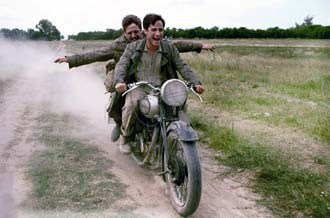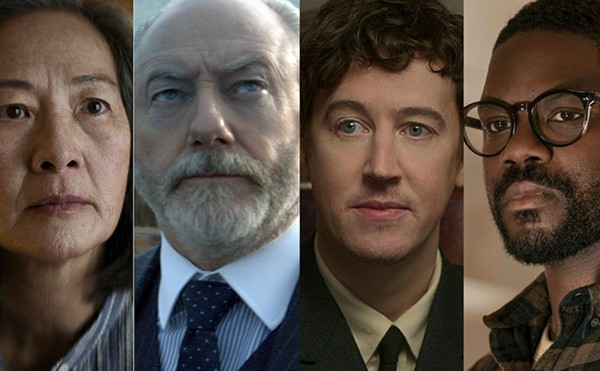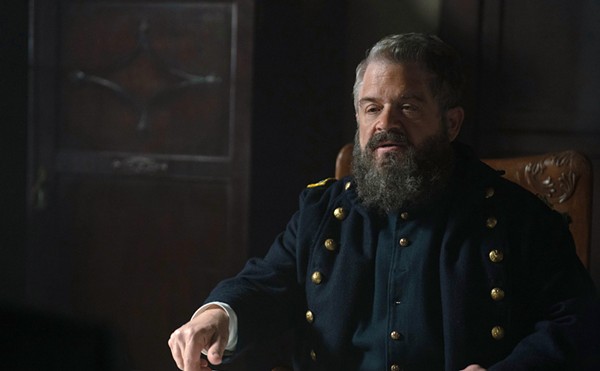|
Young Ché Guevara found empathy and an identity on a cross-continent road trip "A considerable part of the power of Ché Guevara, I think, that mysterious energy that far outlives his death and his errors, comes from a very simple fact: He was that rare kind of person who says what he thinks and does what he says." His image is as synonymous with revolution as it is with radical chic, both here and throughout América Latina. In the 35 years since Ernesto Guevara de la Serna's death, his legend continues to grow, fueled by his historical deeds and a romanticism attached to them from afar. Chances are, you've seen his image on T-shirts and dorm room posters, that familiar visage screenprinted and displayed by a few fans, followers, devotées and a far greater legion who know little about the man other than his full name. Much like Frida Kahlo, Ché has become a hip icon embraced or, more to the point, appropriated by counterculture kids living here in the belly of the beast. La Raza, too, can proudly claim Ché as their own, and look to his actions - as a challenger to U.S. domination and imperialism, as an idealistic dreamer with a poet's heart who fought and died for a cause "guided by great feelings of love," as he put it - for inspiration and motivation for activismo. To see his legacy turned into an advertising tool and bandied about as if he were a pop musician rankles. Yet, before we bemoan this crossover (or, worse, write him off) there are a few things worth keeping in mind. Ché was an icon even before his death, a symbol of the Cuban Revolution and Latin America's own unique brand of comunismo. Chicano, black, and white radicals who participated in the burgeoning American cultural and artistic movements of the late '60s - including several who traveled clandestinely to the island - said as much. Even during his time Ché was a cause celebre; without all the attention he received then, there wouldn't be as much attention paid to him today. Yet, in remembering the Revolutionary Ché, the new man born out of the socialist struggle, we tend to overlook who he was prior to his ride alongside Fidel: a child of the Argentinean elite from upper-middle class origins - the life he most likely would have lived had he not accompanied Alberto Granado, his friend and fellow medical student, on a motorcycle road trip across South America. In the course of their eight-month, 7,200-mile trip, Ché awakened to the poverty and inequality endemic to the continent's sister countries, as well as the peoples' strength and determination to survive. The Motorcycle Diaries, directed by Walter Salles (Central Station), takes us to that point in young Guevara's life, committing to film screenwriter José Rivera's interpretation of Guevara's Notas de Viaje and Granado's Con el Ché por Latinoamerica. Guevara, here nicknamed "Fuser," sets out with Granado on his rickety old motorbike, La Poderosa, "the mighty one," to volunteer at a San Pablo leper colony in the Amazon basin near Iquitos, Peru. As they travel from town to town, they speak with everyday people - fishmongers and market vendors, displaced miners, a pair of pretty Chilean sisters, and a young boy with a profound sense of history. Yet initially, the two men act more like con artists in training than would-be revolutionaries, save for Guevara's honesty, which foils many a scheme before it even has a chance to take off.
So why are you traveling? she asks. "We travel to travel," he says, with an ever-so-subtle shift of tone in his voice.) As played by Gael García Bernal, the asthmatic doctor-in-training is a timid, pensive, and sensitive young man who stumbles over his dance steps, writes his mother regularly, and, unlike Granado, shies from hitting upon every woman he encounters: In short, he is the opposite of Bernal's cocky, arrogant adolescent in Y Tu Mamá También. By the film's end, Guevara realizes how much he's changed, slowly, gradually, right before our eyes. "I'm not the same anymore," he concludes. Like Simón Bolívar two centuries before him, Guevara dreams of a united continent (he offers a toast to the Liberator's dream during the film's only truly didactic moment), but this isn't a tale about heroic feats or popular uprisings. Like the best coming-of-age stories, the beautifully filmed Motorcycle Diaries shows how the experiences of two young and idealistic men shaped and changed their outlook on life. Salles, to his credit, wisely sidesteps around the "great man" theory of history and avoids a Forrest Gump-ian, teleological rendering of Guevara's influences. This journey radicalized both Guevara and Granado, in ways that their education and upbringing alone never would have, although those advantages enabled them to take off on their adventure. Based on their journals, written without the benefit or gloss of hindsight, yet filmed in the present moment, at a time in which the depth of inequality for those in Latin America and their relatives here in the United States remain strikingly similar to those faced a half-century ago, Motorcycle Diaries reminds us that empathy and experience, not fashion statements or fancy pedigrees, are needed to challenge the system and, hopefully, possibly, eventually, change the world. •
|
12,000 kilometers in their footsteps
Thu, Oct 14, 2004 at 12:00 am
Tags:

KEEP SA CURRENT!
Since 1986, the SA Current has served as the free, independent voice of San Antonio, and we want to keep it that way.
Becoming an SA Current Supporter for as little as $5 a month allows us to continue offering readers access to our coverage of local news, food, nightlife, events, and culture with no paywalls.
Scroll to read more Movie Reviews & News articles
Newsletters
Join SA Current Newsletters
Subscribe now to get the latest news delivered right to your inbox.














